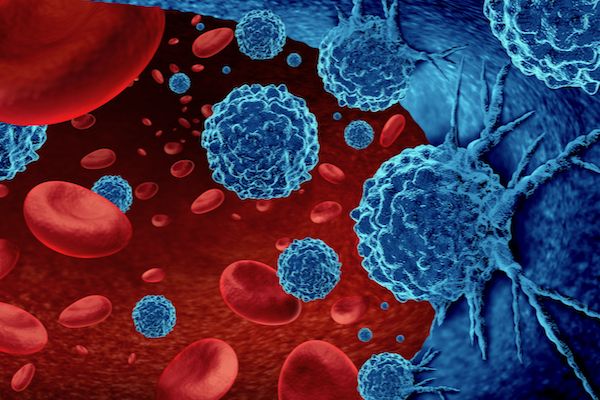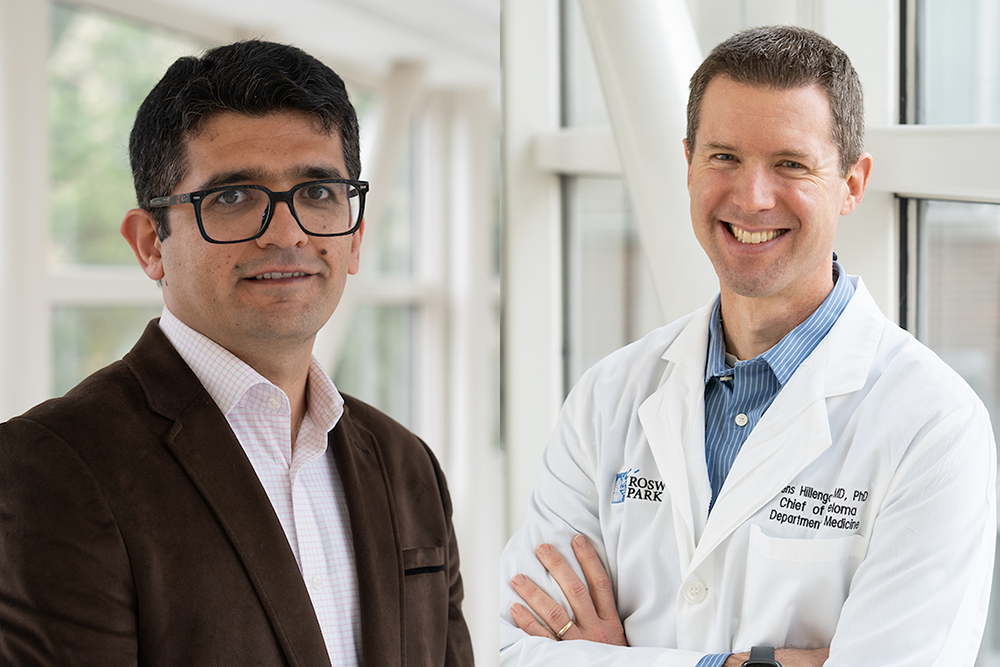Research shows that blocking CXCR2 receptor reduced tumor growth and improved survival; clinical trial underway
- Team identified 3 distinct subgroups of neutrophil immune cells
- New strategy focuses on blocking CXCR2 receptor's pro-tumor effects
- Phase 1 study currently enrolling patients at Roswell Park
BUFFALO, N.Y. — Multiple myeloma, a relatively rare form of blood cancer, remains difficult to treat despite significant advancements in new treatments, largely because it generates a pro-tumor environment that allows it to escape the body’s immune defenses. A team of collaborators from Roswell Park Comprehensive Cancer Center and the Dana-Farber Cancer Research Institute uncovered the important role played by certain immune cells — called neutrophils — in this process.
The findings appear in a new study in the journal Blood. The research highlights a novel mechanism by which multiple myeloma evades the immune system and proposes a new therapeutic approach — targeting neutrophils — that could enhance the effectiveness of current treatments.
Using CT-guided biopsy to collect samples from the bone marrow and tumor sites of patients with multiple myeloma, the research team applied cutting-edge techniques like single-cell RNA sequencing and imaging to understand the diversity of cells surrounding the tumor.
“We discovered three distinct groups of mature neutrophils, each with unique characteristics,” says study co-senior author Hemn Mohammadpour, DVM, PhD, a faculty member in the Department of Cell Stress Biology at Roswell Park.
One group in particular, the team noted — marked by the proteins TREM-1 and CXCR2 — was especially prevalent at tumor sites, and strongly suppressed the activity of T cells, which are crucial for attacking cancer.
“Importantly, when we retrospectively analyzed the data, we found that multiple myeloma patients with high levels of this neutrophil group tended to have shorter survival times,” notes Dr. Mohammadpour. “Through our laboratory studies in preclinical models, we then discovered that blocking CXCR2, a specific receptor that supports neutrophil function, reduced tumor growth and improved survival — especially when combined with current standard-of-care treatments.”
A first-of-its-kind clinical trial now underway at Roswell Park (NCT06622005), supported by the Roswell Park Alliance Foundation, the V Foundation and an R03 award from the National Cancer Institute, is assessing whether this strategy is safe and may be effective in patients with multiple myeloma. For information about this or other clinical trials available at Roswell Park, call 1-800-ROSWELL (1-800-767-9355) or e-mail: askroswell@roswellpark.org.
“This project is true ‘bed-to-bench-and-back’ research bringing together a team of basic, translational and clinical scientists to advance care in patients with a still-incurable disease,” adds co-Senior Author Jens Hillengass, MD, PhD, Chief of Myeloma and Amyloidosis and Vice Chair for Research within the Department of Medicine at Roswell Park.
Research collaborators include co-first authors Joshua Rivera, PhD, from Dana-Farber, and Qi Yan, PhD, from Roswell Park.
###
From the world’s first chemotherapy research to the PSA prostate cancer biomarker, Roswell Park Comprehensive Cancer Center generates innovations that shape how cancer is detected, treated and prevented worldwide. Driven to eliminate cancer’s grip on humanity, the Roswell Park team of 4,000 makes compassionate, patient-centered cancer care and services accessible across New York State and beyond. Founded in 1898, Roswell Park was among the first three cancer centers nationwide to become a National Cancer Institute-designated comprehensive cancer center and is the only one to hold this designation in Upstate New York. To learn more about Roswell Park Comprehensive Cancer Center and the Roswell Park Care Network, visit www.roswellpark.org, call 1-800-ROSWELL (1-800-767-9355) or email ASKRoswell@RoswellPark.org.
Jane Rose, Media Relations Specialist
716-845-4919; jane.rose@roswellpark.org

